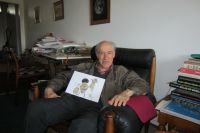Biography of a cartoonist

Len Sak seen here with a cartoon depicting Jojo
(Image: NMF)Len Sak was born in the seaside suburb of Humewood in Port Elizabeth in 1931. At a young age he was fascinated with the new forms of media that were becoming widespread in South Africa, such as sound films, radio and especially comics. Influenced by Hal Foster’s Prince Valiant, British humour comics, Beano and Dandy, and South Africa’s own Bob Conolly, Len soon realised that he had a talent for imaginative drawing, and at the age of 10 became determined to follow his dream of being a professional cartoonist.
A natural autodidact, Len never pursued a formal education in art. Instead he preferred to learn by immersing himself in the world of comics and cut his teeth by lampooning his teachers at school, much to the delight of his classmates. However, it was during a half-hearted, parent-pleasing stint studying for a Bachelor of Commerce degree at Rhodes University that he got his first taste of publishing by providing illustrations for the fortnightly Rhodeo newspaper.
Len eventually abandoned his degree and moved to Johannesburg in 1951 where, after several years, he secured his first big assignment drawing cartoons for the Bantu World. At that time, homegrown comic features were still relatively rare in South Africa, and virtually unknown in the black press. It was only a few years later, in 1958, that he started drawing politically oriented cartoons and illustrations for the Golden City Post and Drum magazine in its South African and various pan-African editions. In early 1959 he started producing his most famous character, Jojo, an everyman whose adventures would present township life in a humorous and satirical manner, and whose monthly, weekly and daily appearances have continued for more than 50 years.
Despite successfully launching Jojo in Drum and undertaking a wide range of freelance assignments, Len became convinced that the South African market was too confined. He relocated to London and found opportunities in the Daily Mirror group’s children’s comic subsidiary, Fleetway Publications. While his work in London was well received, he missed the connection he felt with his South African readership and decided to return home. It is to this deep empathy with his audience that Len attributes his success in creating cartoons and comics that a black readership could identify with despite his being isolated from them by apartheid’s historic realities.
On his return from the UK in 1965, Len resumed his links with the Argus-owned World daily newspaper. For the next 40 years he produced humorous and political cartoons, comic features, illustrations and educational series for the World, Weekend World, Post, and Sowetan, a commitment that ended in 2005 when he began to focus on his own publishing goals.
While Len’s position afforded him some protection, and his political cartoons were never banned, the threat of government sanction was ever-present, and serious social commentary had its hazards. However, while being deeply concerned with political issues, Len never joined any of the political parties in South Africa. He describes himself as being “not a joiner” and that he “values that freedom and independence”. Perhaps this objective quality also contributes to the bond between Len and his readers, with whom he feels his allegiance lies. This very special connection has been confirmed by surveys right up to the present time.
Len states that his cartooning has always been an attempt to engage with what was happening socially in South Africa, and now, at the age of 80, he is still deeply involved. Since retiring from newspaper publications he has been devoting his energies to creating illustrations and comics for various NGOs and pursuing his dream of creating a social-development themed “people’s comic book”.